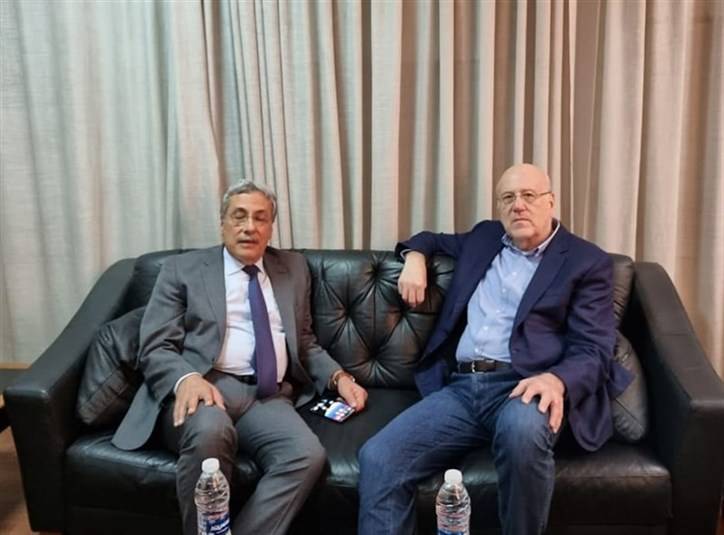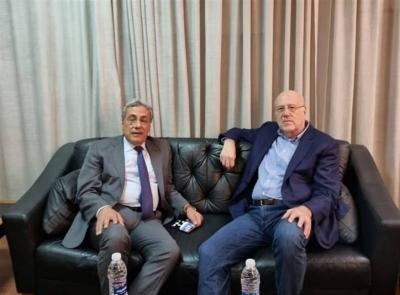"It’s not about the pomegranate, but rather about full hearts." This is the golden rule that Lebanese officials do not miss an opportunity to embody in both big and small issues. As is often said about them, they can argue over the gender of angels, distract themselves with trivial details, and neglect the broader issues. What took place yesterday surrounding the appointment of French lawyers to assist the head of the Litigation Authority in the case filed by the French state before the French investigating judge regarding Anna Kusakova and her associates annihilates the remnants of Lebanon's image both locally and abroad.
Two days ago, caretaker Prime Minister Najib Mikati called for a Cabinet session to discuss the issue of entering into an agreement by mutual consent with French lawyers. The Secretary-General of the Cabinet, Mahmoud Makiyeh, sent a letter to Justice Minister Henri Khoury, at Mikati's request, urging him to attend an urgent Cabinet meeting with a single item on the agenda related to the agreement with French lawyers. However, instead of promptly engaging in dialogue and discussion within constitutional institutions, officials rushed to hurl accusations at each other either through press conferences or statements. Yesterday, the Justice Minister held a press conference after informing the Prime Minister’s office that he would not attend the session, affirming that "we have signed the contracts and they are still valid, and I am committed to them and will not back down." The media office of Mikati replied in a statement that "in light of the Minister of Justice’s announcement of his non-attendance at the session, it has been postponed to a later time," considering that "the minister's position of obstructing the work of constitutional institutions would bear personal constitutional, legal, and moral responsibility for any harm that may affect the higher interests of the state." Khoury responded to this, confirming his adherence to his position, stating that he would not accept the state of Lebanon not being represented in trials outside Lebanon, and those planning to eliminate it would bear the consequences of their actions. If the French judiciary issues a decision to seize the assets of Lebanon’s central bank governor, Riad Salameh, they would be confiscated in favor of the French treasury.
Amid the exchange of statements where Lebanon's reputation is at stake following the distortion of its image and the fragmentation of its institutions, a source close to Mikati indicated to "Wardena" that another ministerial session would be convened soon as the state's prestige is at stake. If the Justice Minister does not attend, each party will bear its responsibility, but it is better and safer for the concerned minister to attend the meeting to make the decision, which the Prime Minister insists is necessary. Should matters escalate further, it would then be up to Mikati to make the appropriate decision, whether the government would decide on the naming of the lawyers or leave Lebanon without lawyers defending its higher interests before the French judiciary, which would bring about negative repercussions on its image.
Politically, it is clear that matters continuously escalate into a tug-of-war concerning various issues. It is no secret that political wrangling, frustrations, and alignments cancel the democratic process from the politicians' lexicon, who should "always resort to institutions for discussion and addressing pending issues, rather than through press conferences and statements and counter-statements that will lead to no result at a time when countries, near and far, are working for the benefit of their own nations for the sake of their peoples," as the source articulates.
Since the essence of the conflict revolves around priorities and authorities, a decisive legal word is necessary in this context. A legal source deemed the appointment of lawyers to defend the state's higher interests a necessary and crucial matter, as should the French judiciary issue a decision to seize the assets of the central bank governor, Riad Salameh, and if it is proven that these assets and funds are contrary to the law, they would be confiscated in favor of the French treasury, and these funds belong to Lebanon, being an inevitable result of the governor’s conduct of his role as the head of Lebanon's central bank. Thus, if the assets are seized, they should benefit the Lebanese state.
The Justice Minister or any other legal authority cannot independently decide on appointing such lawyers without consulting the Cabinet, and the process of selecting lawyers follows a mechanism whereby the Justice Minister presents his proposal to the government, which can accept or reject it after discussion among the ministers. Furthermore, it is not within the purview of the Justice Minister or any other legal body to appoint such lawyers without referring back to the Cabinet, which alone holds the authority to decide this matter.
While many wonder about the reasons that led the Justice Minister to appoint lawyers without bringing the file to the Cabinet, given that the procedure is clear and the case should not represent a new source of conflict among Lebanese, especially as it concerns the higher interests of the state, the Cabinet has the authority to vote in the event that the Justice Minister refuses to attend the government session dedicated to this issue after requesting a letter from him regarding the proposed names, discussing the resumes of each lawyer, their competence, experience, and backgrounds, as this matter is necessary and urgent, relating to the higher interest of Lebanon.
If the team of lawyers does not obtain an official government decree, they cannot appear before the French court, and the opposing team will challenge their work, further complicating the issue before the French judiciary and tarnishing the Lebanese judicial image even more. This situation necessitates that everyone "close legal loopholes rather than open additional ones."




